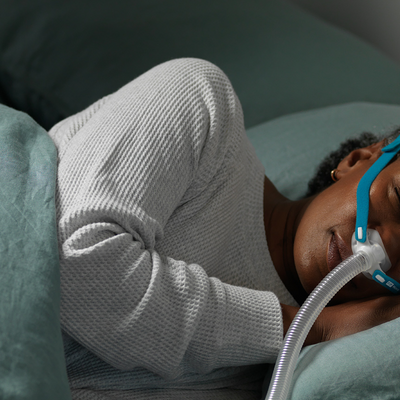June 7, 2023
Written by Scott Baylon
Have you ever wondered why you can't remember your dreams or why they seem to be few and far between? It turns out that the absence of dreams may be more than just a fleeting curiosity—it could be an indicator of a deeper underlying issue, such as sleep apnea. In this article, we explore the fascinating link between the lack of dreams and sleep apnea, shedding light on how the condition can disrupt your sleep stages and prevent you from reaching the vital deep sleep that rejuvenates your mind and body.
Understanding Sleep Stages
Before we dive into the connection between sleep apnea and dreams, let's briefly touch upon the different stages of sleep. Sleep is a complex process that involves cycles of distinct sleep stages. One crucial stage is known as rapid eye movement (REM) sleep, during which dreams most commonly occur. REM sleep is a period of deep sleep characterized by rapid eye movements, increased brain activity, and vivid dreams. It is during this stage that our brains process emotions, consolidate memories, and facilitate learning.
The Impact of Sleep Apnea on REM Sleep
Sleep apnea, a common sleep disorder, can significantly disrupt the normal sleep cycle, including the REM sleep stage. People with sleep apnea experience recurring episodes of interrupted breathing during sleep, leading to brief awakenings throughout the night. These disruptions prevent them from entering and maintaining deep sleep stages, including REM sleep.
The Connection Between Lack of Dreams and Sleep Apnea
As a consequence of disrupted sleep architecture, individuals with sleep apnea may experience a lack of dreams or a decreased ability to recall them. Without sufficient uninterrupted time in REM sleep, the opportunity for dreams to manifest becomes limited. This lack of dreaming can be an indication that your sleep is being disrupted, potentially due to sleep apnea.
The Importance of Seeking Treatment
If you find yourself rarely experiencing dreams or unable to remember them, it is crucial to consider the possibility of underlying sleep apnea. Untreated sleep apnea can lead to a host of negative health effects, including daytime fatigue, decreased cognitive function, and an increased risk of cardiovascular problems. Seeking proper diagnosis and treatment for sleep apnea can help restore the integrity of your sleep stages, including REM sleep, allowing you to experience more vivid dreams and reap the benefits of restorative rest.
To see if you're at risk, try taking this 1-minute quiz: Click here
Conclusion
While the absence of dreams may seem inconsequential at first, it can serve as a valuable clue when it comes to identifying potential sleep apnea. By recognizing the connection between the lack of dreams and disrupted sleep stages, we can better understand the impact of sleep apnea on our overall sleep quality and well-being. If you suspect sleep apnea may be affecting your dream patterns, we encourage you to get tested. Remember, restoring the balance of your sleep stages can not only bring back vibrant dreams but also improve your overall sleep and contribute to a healthier, more fulfilling life. Sweet dreams await!










































